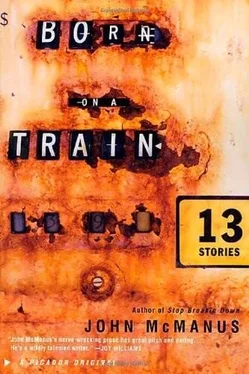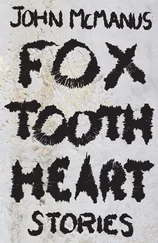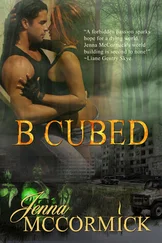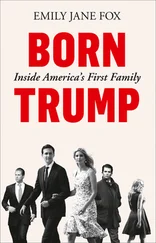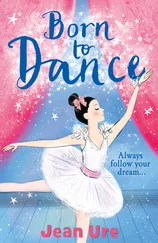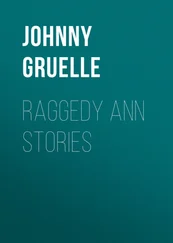You’d better have a job by the time I get back, Leila told me.
I’ll be the housewife.
Won’t pay much.
I didn’t care. I had the money for six weeks’ rent, food, beer, I figured, and she was leaving me alone with Patrick’s chest, his shoulder blades, and there we stood on the ankles of Gunnel Mountain. I loved the air. Motes of dust rose from the water. I stood so cold but bathed in yellow sunlight. Skunk cabbage was dead and underground, existing only as roots and dried leaves. Blocked water splashed above the rock row. I built it up with stones like stillborn children, gray and heavy and folded in upon themselves. I stirred up silt as I widened the base; it sank in fingery spirals into mortar.
The best part was the cemetery beneath the sunset. A yellow-jacket chased me around the grave of Carson Crawford. Red umbrellas hung by threads from treetops. Leila showed us where we’d sit amongst the stones if we were feng shui artists’ chairs. Patrick was east, I was west. Leila had a bed of acorns gathered in a hole beside her leg and bats flew well past dusk above our picnic.
You look perfect against that stone, Leila said to Patrick. Don’t you think? she asked me.
I shook my head. It’s a conjurer’s trick, I said. He’s kind of ugly when you think about it. Patrick swatted my leg. He’ll have every Knoxville girl on him when I’m gone, said Leila.
That sounds good, he said.
If they do, they’ll end up like the one in the song, she said.
I don’t remember the song.
Both of them died, I said. They floated down the river out of town.
But there’s a dam there, Patrick said.
It was a long time ago, I said. It was before the dam.
Leila told us all to stand up. Look for a grave that died the day you were born. I walked down a mossy row of lumps and clover and read dates that were abbreviated, fading. More children had died in winter than in summer. The trees were mainly cedars, their sap ripe in my nose, and I forgot what year we were in, with all those numbers.
Here’s my birthday, Patrick said, but it’s 1930.
I wondered if the bones survived as lodes of powder in the soil.
Keep looking, Leila said.
People weren’t buried here that late, we’re too young.
But Leila found it: it was mine. Her name was Jannie Carpenter, and she’d died at ninety-one and had a husband dead beside her. They had mothered and fathered three dead baby boys.
It’s so quiet here, said Patrick.
Imagine if we all just started screaming, Leila said. As loud as we can go, until our throats burn.
Or digging, Patrick said.
What would we scream? I asked.
The dead babies, Leila said. And the spiders. They were all over her shirt. Below her nose a shadow swung darkly back and forth. It got black at night there like it didn’t get black anywhere on earth. The graveyard had made us into corpses. I saw the first star in the sky in Patrick’s eye, reflected. The stump he sat on had no stone to mark its death.
Who drives back? said Leila.
They hit their own palms twice with fists, and then Leila made a kite’s shape with her thumbs and index fingers. Patrick waved his hands like rain, then tossed the keys, and Leila caught them. You always do diamond, he said.
Diamond cuts glass, glass draws blood, blood stains diamond. I sat in the back again and stretched across the imitation leather. Leila dragged her gold ring’s plain surface across the window of her door. She’d never owned a diamond, never carved her words indelibly into glasspanes.
* * *
So we sat now at the kitchen table drinking whiskey, playing poker, betting pennies; one-eyed jacks were wild, and Patrick couldn’t bluff to save his life. A cold breeze filtered through our bleak apartment; I was winning all the pennies, which I planned to use to buy a fifth of gin, which was what I’d wanted in the first place. I’ve always hated whiskey.
I don’t even know her number, Patrick said. The rooms had secret shafts of moonlight, blue flames in the stove’s eyes.
You could find out, I said, knowing he thought it too complicated, too arduous somehow to call long-distance information; after all, it was three thousand miles away.
Raise three.
See it and two.
Call.
It was so stupid to play poker with just two people; we might as well have played war, or built castles out of cards.
I think I’ve fucked my stomach up, he said. I feel full after I eat three bites, like I’m gonna burst. He was skinny; it was a perfect ratio of emptiness to flesh. This was his seventh day off heroin, and his face had begun to glow again, which isn’t to say I’d stopped wanting him while he was paler, or ceased ripping his letters into small, uneven pieces.
Maybe it’s the drinking.
He shook his head. That’s the one thing tried-and-true, he said, is drinking.
There was a cold, blue light between us; there were chipmunks in the walls that scurried down the slopes of tunnels shapeless to my eyes. Oak leaves brown and rigor mortis-stricken fell into the shelter of our room through the deck door, the dusty oven window. I was wrong about the stove; it didn’t bloom that night; it had withered in the afternoon and died, when a handsome man from United Cities Gas turned off our pilot light. He had bent so that his torn ear like a tomcat’s watched me — two flowers dead: our stove had but the two eyes.
Patrick was sitting up tensely on his elbows. He closed his mouth and opened it and closed it. He wanted me to help him speak, I knew; he had his leather coat on. For fourteen months I’d processed Leila’s moans at night through a crooked wall and willed myself into her skin to hold a hundred eighty pounds up by my haunches: he was shivering, he was six-foot-four, and if I die before I wake I prayed that I’d be resurrected in her mold.
Once I’d walked in on them, on purpose, just to see him. They moved like cellophane. Probably they won’t again. I’ve never dismantled anything so intricate. Leila was a pretty girl who played the clarinet, spoke with a soft, kind voice, made necklaces for friends of friends she barely knew. Her letters bore a script like boys’ eyebrows. I thought of that after I’d torn them all apart. Once when I was seven years old I rode down Johnny Boone’s yard on a Big Wheel with his silver hamster in my hand and my dog ate it. Johnny cried. My stomach had felt the same as with the letters: all the dead men in heaven were looking down at me, watching for reasons not to be my friend.
We should just go somewhere, said Patrick; it’s no good being here. Looking into my eyes he said, I’m drunk enough to do anything.
Out to see Leila? I asked.
Have you— he began and stopped. To leave it unsaid he poured himself a drink but the bottle held none, or else a few last drips, and he took his jacket off. His skinight rayon shirt was ribbed and black, like something I would wear to go dancing, to be cruised. We drank the vinegary dregs of week-old wine that glistened in its bottle on the counter. Patrick said things like, I’m too old to meet anybody new; things like, I’d guess they’ve got phones out there in Washington.
They have area codes and stuff, I said.
We could see the whole city from that window, thunderclouds that bore so many lights and blood-red brakings down on Western Avenue reflected off the Sunsphere’s ball of glass and mirrors sixteen stories high. I saw Patrick working up to something: he’d curled up his eyebrows, his face like a helium balloon. All the water in my body parted with the music, and Patrick sang along and swayed to the rhythm. I just want to dance in your tangles, to give me some reason to move. When he said, Have you ever been attracted to me? he pushed it out of his mouth in one breath, his eyes aglow but moving nervously across my face.
Читать дальше
